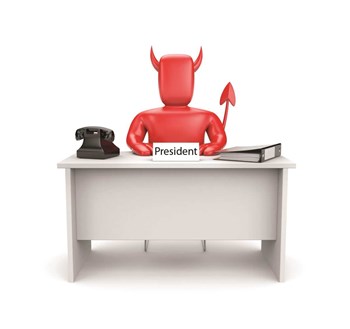
Most condo/HOA boards are made up of ordinary, well-meaning folks who volunteer for the relatively thankless job of running their association. They donate their time, expertise, and effort to make their community as functional, solvent, and harmonious as possible.
That being said, however, if you ask any management or legal pro working in the condo/HOA industry, they'll be able to tell you stories of boards and board members who were the exact opposite of all those admirable traits. Some are motivated by greed, by ego, by spite, or by the fact that they're disturbed individuals who—for whatever reason―decide that the most appealing vehicle for their brand of crazy is their condo board. The managers and attorneys unlucky enough to deal with one (or more than one) of these people on a client board can carry the post-traumatic baggage for decades.
“I’ve said this for years,” says one veteran manager. “Managing property is not that difficult. It’s either broken, or it’s fixed. It’s either growing or it’s dead. It either needs painting or it doesn’t. What can make this job very difficult sometimes is the people.”
Based on a totally unscientific poll of a small sample of management pros, here are some of the more common nefarious characters who can make both board service and management a nightmare.
The Megalomaniac
Caligula, the deranged first-century emperor of Rome, thought himself a god and behaved accordingly. He’d feed courtiers to the lions if they didn’t respond to him with what he regarded as proper respect; he’d have his lascivious way with wives of senators; he insisted that his favorite horse be given an official title. Board members may not go around setting their enemies on fire in 2015 New York, but some do carry on with pomp and circumstance as if they were heads of some despotic state.
“You have board members who just live for their board position, and feel like they should be treated like royalty,” says Steven D. Sladkus, an attorney and partner with the Manhattan law firm of Wolf Haldenstein Adler Freeman & Herz LLP. A little whiff of egomania may not be the worst thing in the world for a person in a leadership position, but if the attendant arrogance and narcissism interfere with fulfilling job duties (and it often does), it can make life difficult for other board members and any professionals who have to deal with them.
Caligula was eventually assassinated by his own Praetorian Guard. His 2015 board member counterpart will have to just get voted off.
The One-Trick Pony
If you’ve seen it once, you’ve seen it a thousand times: a disgruntled resident runs for the board to address a single pressing issue—Paint the lobby! Allow dishwashers! Fire the super!—and then blanches in the face of actual responsibility.
“The ‘one issue’ board member,” says Jeffrey S. Reich, who is also a partner at Wolf Haldenstein. “The board member who is either anti-pet or wants to get themselves a parking space.” It’s not that they care so much about their issue that's the problem—it's that they don’t care about anything else. “There are some members who join the board over one issue, and really don’t fully participate on the board, because they’re only concerned with that one thing,” says Reich. “And when it gets done—or it gets shot down—they don’t carry their weight on the board.”
Sladkus has had similar experiences. “I’ve seen people join a board who have no interest in being on a board other than to, let’s say, fire the managing agent,” he says. “Or to further their own interests. For instance, if they’re in litigation with the building, or if they want something done for their own apartment. Unfortunately, it's not a rare occurrence.”
The Pugilist
Some board members like to fight—and not just with their words. To some extent, occasional flare-ups are to be expected. With so much on the line—these properties are either people’s homes, or their sources of income—tempers may get heated from time to time.
Understandable as it might be however, some board members indulge in behavior most unbecoming a grown adult, much less someone in a leadership position. “I’ve seen a lot of board members who are very easily upset, and who blow their stack when something is said to them that should never warrant such a response,” says Sladkus.
“Boards are the place where you’ll see the largest swing of emotions, because for most people, their apartment is their largest single asset,” he says. “And people get very, very emotional if something is going against the way they want it to go. Then it just depends on what each person’s personality is. There can be yellers and screamers, or there can be people who just shut down, and that’s how they deal with controversy.”
And some people solve problems—or try to—with their actual, literal fists. “I’ve seen board members who fight with other board members just because they like to fight,” says Reich. Violence, needless to say, is not the best way to get the job done.
The Autocrat
When Harry Truman became president after the death of Franklin Delano Roosevelt, his first order of business was to be briefed on the war. As the vice president, he had been completely out of the loop; FDR had not bothered to tell him anything.
Some board presidents operate a lot like FDR with respect to the other board members. “I’ve had board members who have acted as the sole source of information,” says Reich. “They’re the only one who talks to the management company or the attorney or the accountant, and they jealously guard that. And sometimes they’ll use the argument that they don’t want the building to incur fees, and there should only be one person, and that person should logically be the president.”
The result is someone less like the man for whom our East Side highway is named and more like an absolute dictator. “We have autocrats in those circumstances,” says one manager. While too many cooks may spoil the soup, having only one cook who knows the recipe is equally problematic; if he or she is out of town, ill, or otherwise unreachable, day-to-day community business can grind to a messy halt when nobody knows anything about how the building or association is actually run, or how to get access to that information.
The Busybody and the Pervert
Retirees frequently serve on boards, and are often among the best board members. They bring a long resume, years of life experience, and that most precious quality, free time. Sometimes, unfortunately, the same qualities that make retired residents excellent board members can also make them a bit overzealous.
“One retired gentleman I’ve worked with,” says Chip Hoever, CMCA, AMS, PCAM, of Somerset Management in Somerset, New Jersey, “I cannot tell you how many emails I got from him when he was the board president. I told him in all honesty that I got more emails from him than from all my other board members combined. And he was demanding immediate responses.”
Annoying as they are, overzealous board members are a delight compared to board members whose tastes are very...singular. This is thankfully not a pervasive problem, but it does come up more often than you might suspect: board members behaving really badly.
“We had a board president who was caught inside someone’s apartment,” Reich recalls. “He was probably there as a dinner guest or something, but he was caught on the nanny cam, masturbating. How do you deal with that? You normally can’t remove someone as a board member without a vote. So in a situation like that, you go to the person and say, ‘Hey look…we don’t want you on the board anymore, and if you don’t resign on your own, we’re going to hold a meeting and show the nanny cam video.”
Also, you don’t invite him back for dinner.
All this having been said, a good manager will find a way to work with a difficult board member—at least until their fellow board members and residents have had quite enough and vote them off—but there's one miscreant left on the list, and he (or she) is the worst of all:
The Crook
Boards are in charge of an awful lot of money. They are involved with collecting maintenance fees and other dues, doling out work contracts, and hiring and firing employees. Power may not always corrupt but it can certainly be tempting.
“I had one board president who hired his brother-in-law’s company to do construction in a Park Avenue building,” Reich relates. “We came to the conclusion that the company doing the work also did work in the board president’s summer home. And we believed that the co-op corporation ended up paying for those alterations to the summer home.”
Financial mismanagement could be taken to drastic levels, especially during the recent recession. “I had one board president who owned two apartments in a condominium,” Reich says. “One she rented out for profit, and one she lived in. Finally the management team came to someone else on the board and explained that she, the board president, was in significant arrears on both apartments. But the management company had been instructed by the board president not to include her on the monthly arrears reports that the board was getting at the monthly meetings. So the board didn’t know about it. That was a doozy. Here you have someone who is making financial decisions on behalf of the building, who isn’t meeting her own financial obligations to the building and telling management not to include her on the arrears report. That created a tremendously difficult situation, and she was obviously removed as president as soon as it came out.”
And diverting funds is not the worst thing a crooked board member might be up to, as Reich found out: “In one building, we were seeking to remove an unauthorized dog from an apartment. And it had been known in the building that the shareholder who owned the dog in question had been arrested for prostitution. And as far as we could tell, the board president was one of her customers. He was married and lived in the building with his wife, and he was taking advantage of this woman’s services. He put us in a very difficult position, because here we are trying to get rid of the dog, and she raises this defense, and she’s going to embarrass him and the board.”
Even in the worst of times, board members are volunteering their time and energy, and performing a service. Even the nasty ones. And one thing the folks we spoke with all agreed on: it’s not the board members who present the real “people” challenges.
“I’ve been doing this about 20 years, and most of my war stories are with regard to non-board members, the people that I’ve represented the board in dealing with,” Reich says.
...But that's another story for another day!
Greg Olear is a freelance writer and a frequent contributor to The Cooperator.






Comments
Leave a Comment